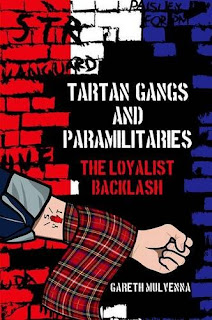The Ulster comic actor and theatrical solo performer James Young has been referenced many times on this blog in the past - this will be the third and final main post about him. He remains such an interesting character in Irish social history, gay culture and in the day-to-day back story of an Ulster at war in the Sixties and Seventies.
Young is remembered in the main for his connection with the Ulster Group Theatre on Belfast's Bedford Street, his bestselling vinyl records that were produced by the Emerald label and for the BBC Northern Ireland Saturday Night television shows in 1973 and 1974. On both record and stage he combined fast witted urban humour - particularly hysterical in the rambling main show introductions - with reflective monologues on life, hardship and death in working class communities.
The two most famous - and indeed saddest - of his monologues in the latter context are arguably I Loved a Papist and Slum Clearance. The first centers around a fateful love affair set fast against the tide of history and the second about how eviction from a condemned house appeared to the elderly resident concerned as threatening to terminate a spiritual connectivity with his own family past.
Young's catalogue of work is so rich and varied in content. There is The Feud - arguably his finest dramatic performance - about how a sectarian grudge between two tough Belfast youths ended in both tragedy and revelation many miles away from Ireland's bitter shores. We Emigrated is another wonderful piece which recalls the experience of emigrants from Ulster in North America. It is somewhat hammy in delivery but at the same time terribly moving when he notes how within transplanted communities in the New World the Catholic-Protestant Christian divide stood as naught and how only distance can sometimes make one retrospectively embrace the positivities of Irish life - the rain, bigotry and everything. Indeed The Feud also references the garnering awareness of a Belfast father of his son's loneliness in New York - more and more he talked of Ireland and the people that he knew, but the letters sounded lonely, and they made me lonely too - which Young delivers to perfection.
The four monologues I have always found particularly interesting with Young are those that closed the live shows - they can be found on the Group Theatre performances captured on the albums Young at Heart, Young and Foolish, James Young's 4th and The Young Ulsterman. To put these into context - the first political murders of the Troubles took place in 1966, civil disorder escalated from late 1968 through into 1969, full scale terrorist activity coalesced from late 1970 onwards and mid-1971 saw Northern Ireland teeter on the brink of civil war. The Young albums referenced were released in 1966, 1967, 1969 and 1973.
Why I Am Here from Young at Heart has the actor answering a question from a pedestrian on a Belfast street as to why he had not attempted to broaden his artistic horizons upon the West End or Broadway stage. Young talks about the physical beauty of the countryside, the community and warmth of the Belfast people underneath the perennial political passions and the homesickness that so many emigrants have felt over the years. The piece ends with Young's wish to end his days in Belfast and his faith in how his talent can perhaps help Northern Ireland people weigh up the questionable rationale underpinning their religious animosities.
Salute to Belfast from Young and Foolish returns to this call of home when Young overhears a passenger on an airbus smugly allude to how easy Belfast is to get away from. In his reply he talks about the meetings he has had over the years with exiles from Belfast resident abroad, the memories they shared with him of places and characters from the past and how the light seemed to fade from their eyes when the conversation drew to an evening's close.
This is Us from James Young's 4th discusses the onset of civil disorder and how the British media selectively ignored the everyday warmth and common sense of the Ulster people and their industrial heritage in their blanket focus on extremism, violence and the foregone collapse of what they presented as a grotesquely constructed and politically fallible Northern statelet.
We're Here For Such a Little Time from The Young Ulsterman has been discussed in an earlier post. Here Young juxtaposes the physical beauty of Ulster with the communal loathing now engrained in society to such a degree that it has turned his earlier faith in an intertwining folk memory - based on a shared experience of backbreaking rural routine and merciless industrial labour - into a literal sick joke.
Young's work is well worth tracking down to this day. In the midst of terrible human butchery he shone a light onto the existent bonds in Ulster society and the bridges that were yet to be burnt. At the same time he provided an extraordinary narrative of a society enduring years of confusion, brutality, disorder and rank strangeness. He thus helps us to recall the people of those times with an extraordinary focus - to a communal backbone and a capacity for emotional endurance that will never be seen again on these islands.
Also, for all the smug arrogance of the metropolitan British elites in living memory, the Ulster Troubles actually do as an historical fact throw up endless examples of political intelligence that are going to be needed sorely over the course of the next calendar year. This to both resolve governmental and party political mistakes of biblical consequence and to heal societal breaches that now appear beyond the influence of God or man alike.


